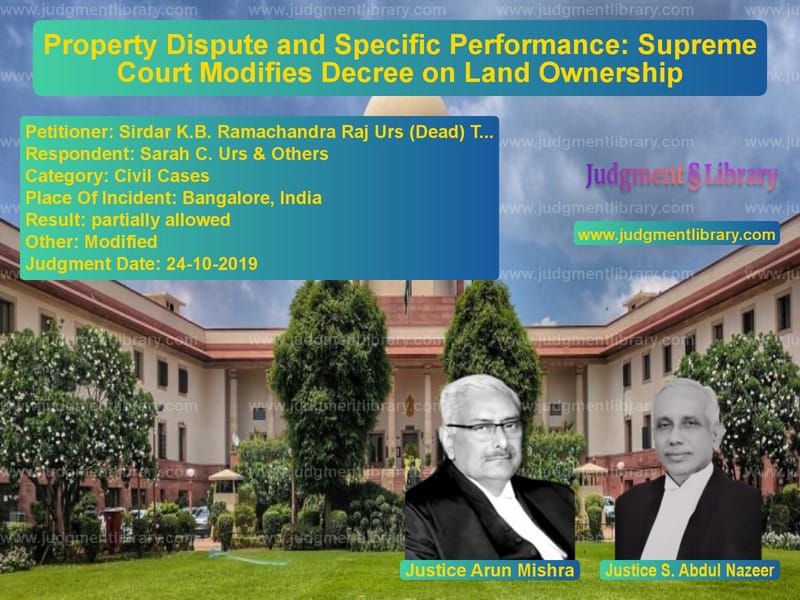Property Dispute and Specific Performance: Supreme Court Modifies Decree on Land Ownership
The case of Sirdar K.B. Ramachandra Raj Urs (Dead) Through LRs vs. Sarah C. Urs & Others revolved around a property dispute concerning the execution of an agreement for the sale of land. The core legal issue was whether the plaintiffs were entitled to specific performance of a contract for the full property or only for the share belonging to the deceased seller. The Supreme Court was tasked with determining the legitimacy of the sale agreement and the extent to which it could be enforced.
Background of the Case
The dispute arose over a property inherited by Princess Leelavathi, wife of the late K. Basavaraja Urs. Upon her death, the property devolved on her husband, K. Basavaraja Urs, and her son, K.B. Ramachandra Raj Urs. The plaintiffs claimed that a valid agreement to sell had been executed in their favor, while the defendants contended that the agreement was fraudulent and did not involve the full ownership rights.
The plaintiffs argued that they had taken possession of the property and made payments toward the agreed purchase price. However, the defendants disputed the validity of the sale agreement, claiming that signatures were obtained under false pretenses and that the property could not have been sold without the consent of all rightful owners.
Petitioner’s Arguments
The plaintiffs contended:
- A sale agreement was executed on April 24, 1979, between K. Basavaraja Urs (through his power of attorney) and the plaintiffs.
- A sum of Rs. 1,00,000 was paid on the same day as part of the consideration, and an additional Rs. 50,000 was paid on June 1, 1983.
- The defendants continuously assured the plaintiffs that they would execute the final sale deed after obtaining necessary clearance certificates.
- The plaintiffs had taken possession of the property in part performance of the agreement.
Respondents’ Arguments
The defendants countered:
- The agreement was invalid as it was based on signatures obtained on blank papers.
- The 2nd plaintiff, who was a legal advisor to the deceased, used his position to fabricate the agreement.
- Defendant No. 1 (K.B. Ramachandra Raj Urs) had not agreed to sell his share of the property.
- The agreement only covered the share of the deceased K. Basavaraja Urs and not the entire property.
Supreme Court’s Observations
The Supreme Court carefully examined the agreement and the claims made by both parties. The Court noted:
“The agreement explicitly mentions K. Basavaraja Urs as the vendor and does not state that K.B. Ramachandra Raj Urs had agreed to sell his share. Therefore, the suit cannot be decreed in full but only to the extent of the share held by the deceased vendor.”
Further observations included:
- The agreement did not reflect the full ownership rights of the property as it only covered the share of K. Basavaraja Urs.
- There was no evidence that K.B. Ramachandra Raj Urs had willingly agreed to sell his portion.
- Estoppel did not apply because the plaintiffs knew about the ownership structure of the property.
- The agreement was valid for the share belonging to the deceased but not for the entire property.
Final Verdict
The Supreme Court ruled:
- The plaintiffs were entitled to specific performance of the sale agreement, but only for the half-share of the property belonging to the late K. Basavaraja Urs.
- The decree was modified to exclude the portion belonging to K.B. Ramachandra Raj Urs.
- The trial court was directed to divide the property into two equal parts and grant possession accordingly.
- No refund of consideration would be provided as the plaintiffs had already benefited from possession.
Legal and Policy Implications
This ruling has critical implications for property law:
- Enforceability of Sale Agreements: A sale agreement must clearly define the ownership rights being transferred to be enforceable in full.
- Limitation on Specific Performance: Courts will not grant specific performance for properties beyond the legal rights of the seller.
- Protection Against Fraud: The ruling highlights the need for clarity and transparency in property transactions.
Conclusion
The Supreme Court’s decision in this case upholds the principle that specific performance cannot be granted beyond the seller’s ownership rights. By modifying the decree, the ruling ensures that legal heirs retain their rightful share while also enforcing valid sale agreements. This judgment serves as a precedent for future property disputes involving joint ownership and inheritance rights.
Petitioner Name: Sirdar K.B. Ramachandra Raj Urs (Dead) Through LRs.Respondent Name: Sarah C. Urs & Others.Judgment By: Justice Arun Mishra, Justice S. Abdul Nazeer.Place Of Incident: Bangalore, India.Judgment Date: 24-10-2019.
Don’t miss out on the full details! Download the complete judgment in PDF format below and gain valuable insights instantly!
Download Judgment: Sirdar K.B. Ramachan vs Sarah C. Urs & Other Supreme Court of India Judgment Dated 24-10-2019.pdf
Direct Downlaod Judgment: Direct downlaod this Judgment
See all petitions in Property Disputes
See all petitions in Contract Disputes
See all petitions in Succession and Wills
See all petitions in Specific Performance
See all petitions in Judgment by Arun Mishra
See all petitions in Judgment by S. Abdul Nazeer
See all petitions in partially allowed
See all petitions in Modified
See all petitions in supreme court of India judgments October 2019
See all petitions in 2019 judgments
See all posts in Civil Cases Category
See all allowed petitions in Civil Cases Category
See all Dismissed petitions in Civil Cases Category
See all partially allowed petitions in Civil Cases Category







